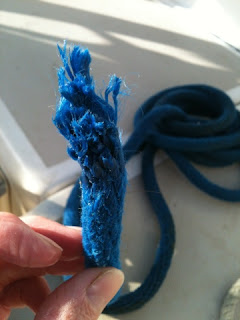Last stop for Echo II: port of Charleston.

(Those of you who wondered whether that previous blog post was all lies can now begin to glimpse a glimmer of truth...?)
Our bouncy pier in the commercial port of Savannah, tucked unsteadily among ocean liners, pilot boats, barges, and tugs. Do you see any other small-ish sailboats here???
Early December, however, is not the best time of the year to tackle the mid-Atlantic Intracoastal Waterway (ICW). North Carolina, Virginia, and Maryland can get chilly. Especially in a leaky boat. (Besides, going north is SO embarrassing when passing all those Bahamas-bound Canadian vessels.) So, reluctantly and after many deep conversations and analyses of the options, we decided to get off the waterway altogether and abandon our boat for the winter.
Our first dock after the momentous decision, in the industrial port of Charleston, South Carolina, was only slightly better than the torturous tie-up in Savannah. More freighters, tugs, barges. And a plethora of rusty equipment, pipelines, and cranes for loading and unloading tankers and container ships.
The port of Charleston: calmer waters than Savannah, but still not a favorite for small-ish sailboats
We grimly endured the night, holding out for the promise of a haul-out the next morning and a place to park the boat until spring.
Ever wonder how a multi-ton vessel with a 45-foot mast (on top) and 4-foot keel (below) gets out of the water and onto dry land? Roughly the same way cattle, horses, and animals destined for the cookpot have boarded ships since the beginning of sea travel--in a sling, lifted by some type of crane. In this case, a heavy-duty "travel lift" at a boatyard.
Drive that baby right up onto the front sling and snap together the back sling behind the keel
Pull the chain and lift her up out of the water: she's airborne!
Drive the travel lift off the finger piers onto dry land, and carry our baby to her winter berth
Put her up on blocks and unsnap the slings, so the travel lift can move on to another haul-out
Her surroundings attest to the superb order, cleanliness, and uncannily high safety standards of this particular boatyard. (Tongue-in-cheek; did you catch that? Wow. It looked so good on the website.)
Well, at least our boat is better off than the boat next door, which seems to have gotten knocked around a bit. Possibly in a hurricane. (Those holes go all the way through the hull.)
And there rests Echo II, next to her flailing neighbor, until the mid-Atlantic sheds its chill and we return to Charleston to fix the leaks and bring our baby home.




















































